Taiwan Semiconductor Manufacturing Co (TSMC, 台積電) founder Morris Chang (張忠謀) yesterday said that Intel Corp would find itself in the same predicament as it did four years ago if its board does not come up with a core business strategy.
Chang made the remarks in response to reporters’ questions about the ailing US chipmaker, once an archrival of TSMC, during a news conference in Taipei for the launch of the second volume of his autobiography.
Intel unexpectedly announced the immediate retirement of former chief executive officer Pat Gelsinger last week, ending his nearly four-year tenure and ending his attempts to revive the company’s past fortunes.

Photo: CNA
Intel hired Gelsinger when the US chip giant was looking for a new chief executive who could persuade the board with a strategy to save the chipmaker, Chang said.
Gelsinger’s eloquence made him Intel’s new leader at the time, he said.
Gelsinger’s strategy and ambition was to restart Intel’s old foundry business, so the company would design and make its own chips.
Intel now seems to be in the same difficult situation it was in four years ago with no chief executive and no strategy, Chang said.
It would be a formidable task for the US chipmaker to turn around its business if the board of directors do not put forward a strategy before picking a new chief executive, he said.
The problem would be less complicated if the company found a new chief executive to carry out the board’s strategy, he added.
Asked what was the main reason behind Gelsinger’s “forced” departure and Intel’s fall, Chang agreed with the idea that Intel missed opportunities and was left on the sidelines of the AI boom.
Gelsinger apparently preferred the foundry business over developing AI, although he also talked about Intel working on AI chips, Chang said.
Being a long-term customer and rival of TSMC, Chang said that Intel’s previous chief executives had been his friends, but not Gelsinger.
He seemed to be “hostile,” Chang said.
TSMC, the world’s biggest foundry service provider, outpaced and eventually overtook Intel to become the world leader in the most advanced technology when its 7-nanometer process technology entered volume production in 2018.
Asked why Nvidiia chief executive officer Jensen Huang (黃仁勳) became a candidate on TSMC’s shortlist to be a chief executive, Chang said Huang’s integrity, great vision and professionalism were the main reasons.
Huang turned down Chang’s offer because of his responsibility running the company he founded, Chang said.
Huang was only on the preliminary short list, he said.
Huang’s 7.5 percent stake in Nvidia could have been an obstacle for him taking the post, as TSMC would have asked him to sell the shareholding to avoid bias, Chang said, adding that he does not hold a major shareholding in any of TSMC’s customers.

AI TALENT: No financial details were released about the deal, in which top Groq executives, including its CEO, would join Nvidia to help advance the technology Nvidia Corp has agreed to a licensing deal with artificial intelligence (AI) start-up Groq, furthering its investments in companies connected to the AI boom and gaining the right to add a new type of technology to its products. The world’s largest publicly traded company has paid for the right to use Groq’s technology and is to integrate its chip design into future products. Some of the start-up’s executives are leaving to join Nvidia to help with that effort, the companies said. Groq would continue as an independent company with a new chief executive, it said on Wednesday in a post on its Web

RESPONSE: The Japanese Ministry of Finance might have to intervene in the currency markets should the yen keep weakening toward the 160 level against the US dollar Japan’s chief currency official yesterday sent a warning on recent foreign exchange moves, after the yen weakened against the US dollar following Friday last week’s Bank of Japan (BOJ) decision. “We’re seeing one-directional, sudden moves especially after last week’s monetary policy meeting, so I’m deeply concerned,” Japanese Vice Finance Minister for International Affairs Atsushi Mimura told reporters. “We’d like to take appropriate responses against excessive moves.” The central bank on Friday raised its benchmark interest rate to the highest in 30 years, but Bank of Japan Governor Kazuo Ueda chose to keep his options open rather than bolster the yen,

Even as the US is embarked on a bitter rivalry with China over the deployment of artificial intelligence (AI), Chinese technology is quietly making inroads into the US market. Despite considerable geopolitical tensions, Chinese open-source AI models are winning over a growing number of programmers and companies in the US. These are different from the closed generative AI models that have become household names — ChatGPT-maker OpenAI or Google’s Gemini — whose inner workings are fiercely protected. In contrast, “open” models offered by many Chinese rivals, from Alibaba (阿里巴巴) to DeepSeek (深度求索), allow programmers to customize parts of the software to suit their

Global server shipments are expected to surge to 15 million units next year, from 4 million units this year, with artificial intelligence (AI) servers accounting for about 30 percent, driven by massive capital spending by major cloud service providers, the Market Intelligence and Consulting Institute (MIC) said on Thursday last week. Major cloud service providers — including Google’s parent company Alphabet Inc, Microsoft Corp, Amazon.com Inc and Meta Platforms Inc — are projected to budget US$450 million for capital expenditure next year, up from US$400 million this year, MIC ICT [information and communications technology] Industry Research Center director Edward Lin